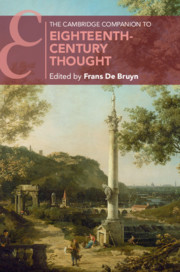17 results
Chapter 7 - Enlightenment, Improvement and Experimentation
- from Part II - Times
-
-
- Book:
- A History of English Georgic Writing
- Published online:
- 01 December 2022
- Print publication:
- 15 December 2022, pp 155-176
-
- Chapter
- Export citation
Illustrations
-
- Book:
- The Cambridge Companion to Eighteenth-Century Thought
- Published online:
- 15 June 2021
- Print publication:
- 20 May 2021, pp viii-viii
-
- Chapter
- Export citation
1 - Philosophical Thought: Theories of Knowledge and Moral Thought
-
-
- Book:
- The Cambridge Companion to Eighteenth-Century Thought
- Published online:
- 15 June 2021
- Print publication:
- 20 May 2021, pp 14-57
-
- Chapter
- Export citation
Notes on Contributors
-
- Book:
- The Cambridge Companion to Eighteenth-Century Thought
- Published online:
- 15 June 2021
- Print publication:
- 20 May 2021, pp ix-x
-
- Chapter
- Export citation
Introduction
-
-
- Book:
- The Cambridge Companion to Eighteenth-Century Thought
- Published online:
- 15 June 2021
- Print publication:
- 20 May 2021, pp 1-13
-
- Chapter
- Export citation
Chronology
-
- Book:
- The Cambridge Companion to Eighteenth-Century Thought
- Published online:
- 15 June 2021
- Print publication:
- 20 May 2021, pp xi-xvii
-
- Chapter
- Export citation
Further Reading
-
- Book:
- The Cambridge Companion to Eighteenth-Century Thought
- Published online:
- 15 June 2021
- Print publication:
- 20 May 2021, pp 248-261
-
- Chapter
- Export citation
Contents
-
- Book:
- The Cambridge Companion to Eighteenth-Century Thought
- Published online:
- 15 June 2021
- Print publication:
- 20 May 2021, pp v-vii
-
- Chapter
- Export citation
Copyright page
-
- Book:
- The Cambridge Companion to Eighteenth-Century Thought
- Published online:
- 15 June 2021
- Print publication:
- 20 May 2021, pp iv-iv
-
- Chapter
- Export citation
Lexicon of Terms
-
- Book:
- The Cambridge Companion to Eighteenth-Century Thought
- Published online:
- 15 June 2021
- Print publication:
- 20 May 2021, pp xviii-xx
-
- Chapter
- Export citation

The Cambridge Companion to Eighteenth-Century Thought
-
- Published online:
- 15 June 2021
- Print publication:
- 20 May 2021
Index
-
- Book:
- The Cambridge Companion to Eighteenth-Century Thought
- Published online:
- 15 June 2021
- Print publication:
- 20 May 2021, pp 262-272
-
- Chapter
- Export citation
Chapter 19 - Edmund Burke
- from Philosophical Frameworks
-
-
- Book:
- Mary Wollstonecraft in Context
- Published online:
- 16 January 2020
- Print publication:
- 06 February 2020, pp 164-172
-
- Chapter
- Export citation
Chapter 9 - Pedagogy and Propaganda
- from Part II - Quoting Shakespeare, 1700–2000
-
-
- Book:
- Shakespeare and Quotation
- Published online:
- 16 June 2018
- Print publication:
- 26 April 2018, pp 156-177
-
- Chapter
- Export citation
Chapter 14 - Shakespeare and the French Revolution
- from Part V - Shakespeare in the wider world
-
-
- Book:
- Shakespeare in the Eighteenth Century
- Published online:
- 05 August 2012
- Print publication:
- 19 April 2012, pp 297-313
-
- Chapter
- Export citation
Contributors
-
-
- Book:
- Shakespeare in the Eighteenth Century
- Published online:
- 05 August 2012
- Print publication:
- 19 April 2012, pp ix-xi
-
- Chapter
- Export citation
29 - Burke and the uses of eloquence: political prose in the 1770s and 1780s
- from PART V - LITERARY GENRES: TRANSFORMATION AND NEW FORMS OF EXPRESSIVENESS
-
-
- Book:
- The Cambridge History of English Literature, 1660–1780
- Published online:
- 28 March 2008
- Print publication:
- 06 January 2005, pp 768-794
-
- Chapter
- Export citation

